Previously on Baxter Building: After 102 issues (and six annuals), Jack Kirby has left Fantastic Four (and Marvel) midway through a storyline, leaving Stan Lee and the fictional foursome adrift while still having to deal with the triple threat of Namor, Magneto and getting an issue out on deadline. Will our heroes be victorious? And are our heroes really that heroic, anyway?
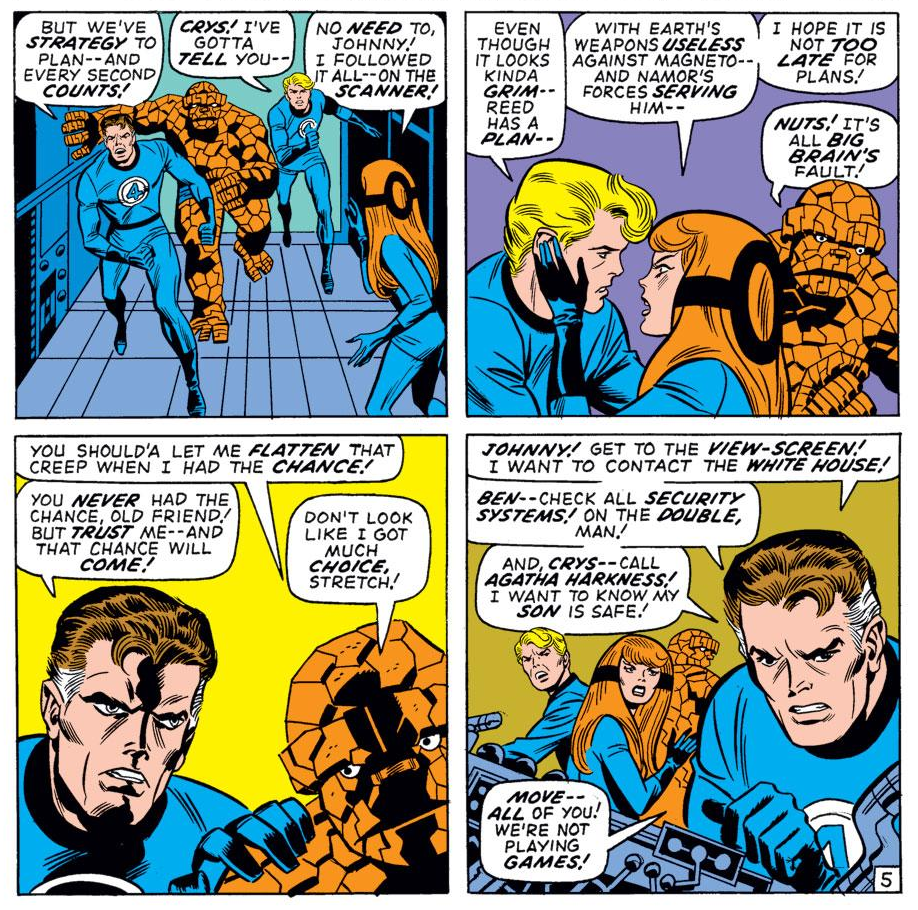
0:00:00-0:06:41: “Everything is so slapdash” is how Jeff describes the issues we discuss in this episode, which are Fantastic Four #103-110 (I say #103-112, which was the original plan, but spoilers: we only get to #110 in the actual episode.) These are the first post-Jack Kirby issues, with art by John Romita and John Verpooten, and John Buscema and Joe Sinnott, and they are… well, I call them absolutely terrible, which isn’t too unfair, to be honest. With Kirby — the series’ main creative force until this point, let’s be honest — gone, how does Fantastic Four fare? Things are looking grim, Whatnauts. With only one “m,” so it’s not a Thing pun.
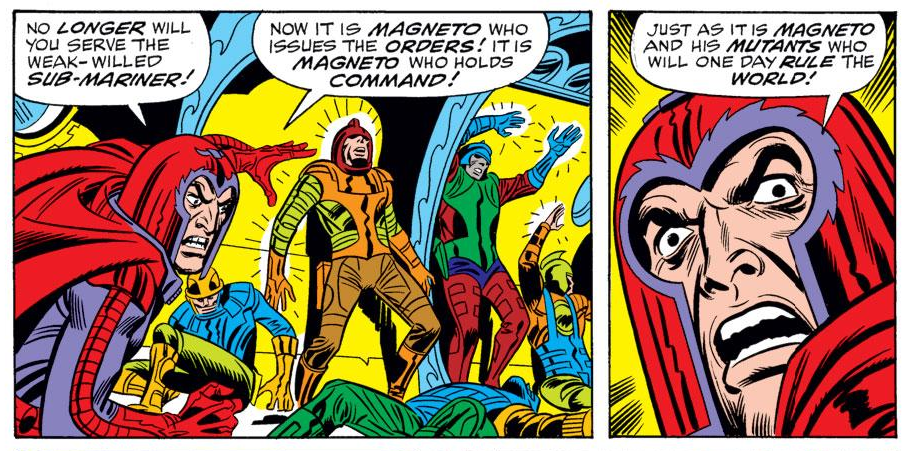
0:06:42-0:24:06: This is what’s happening in Fantastic Four #103: Magneto and Namor are fighting the air breathers! The Thing is fighting the Sub-Mariner underwater for an astonishingly long time! And inker John Verpooten is apparently fighting penciller John Romita, judging by what’s on the page. We talk about Romita’s attempts to draw the most Kirby pages he can manage, and the ways in which he fails (Prepare yourself for some underwhelming Kirbytech). Learn about Jeff’s fantasy about Stan Lee and Judd Apatow working together, and the way in which the Justice League is less sexist than the Fantastic Four! Discover that the Thing’s lungs work differently from other people! Enjoy my lack of understanding about Atlanteans and what they’re made of! Oh, and Richard Nixon makes his Fantastic Four debut! It’s all here, true believers, but none of it is any good.
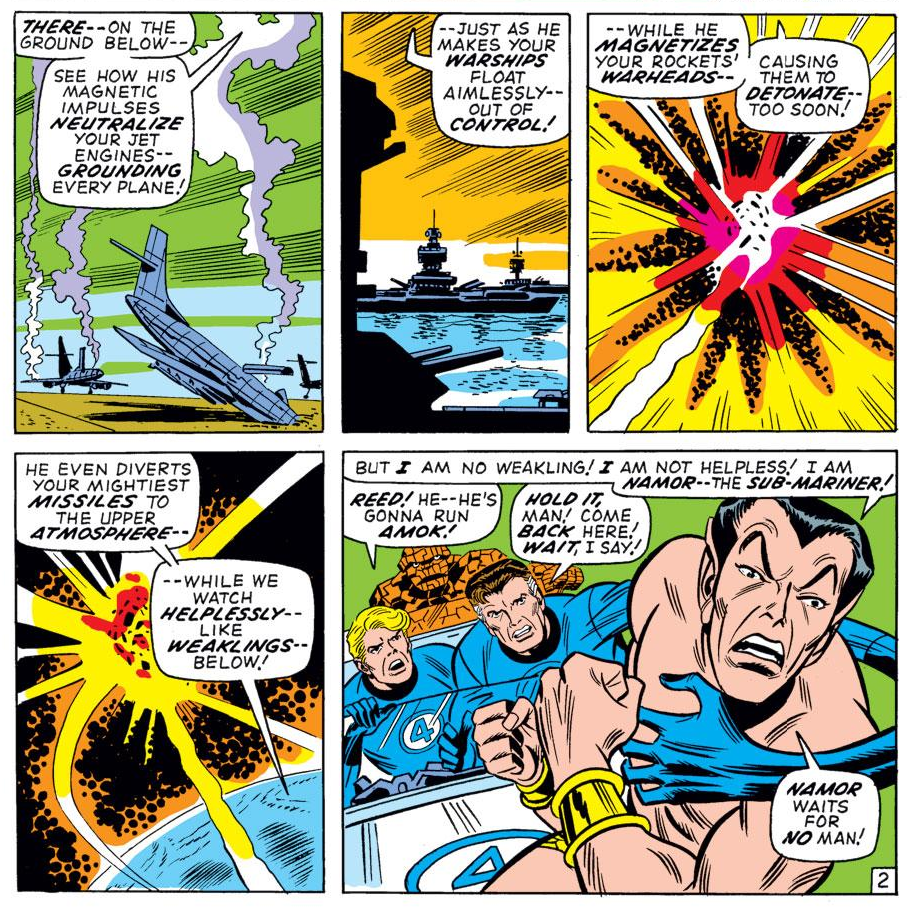
0:24:07-0:43:40: Could FF #104 actually be worse than its predecessor? If you’re judging by the art, then the answer is surprisingly yes, with a second page that we spend a surprising amount of time on, in terms of how disappointing it looks and the skills that Kirby had that Romita lacks — a feeling that’s not helped by artwork that looks unlike Romita’s own work, but very like a bad Kirby parody. Jeff’s description is maybe the best line of the episode: “We’re shooting for a Kirby trope, but on a Don Heck budget.” But don’t worry: the story is almost as underwhelming as the art, with a lackluster plot that features Namor teaming up with the FF, Magneto and the Atlantean army defeating the US military off-panel and between issues, and the power of a cone. Yes, a cone. At least we get a Patented Stan Lee Moral at the end of the issue, even if it bears absolutely no relevance to the story that came before.

0:43:41-1:07:26: Hey Jeff, what should we expect from Fantastic Four #105 (and 106, for that matter)? “Spoilers, everyone: what’s coming up is a two-issue adventure […] in which a brand new villain is launched into the FF canon, and unfortunately, if you thought Kirby was getting underwhelming, here are two issues in which the villain is called ‘The Monster’ and is an amorphous blob with no distinguishing details whatsoever.” Sadly, it’s true — although at least next issue the monster gets a name — but there are highlights to be found this time around, including two wonderful sequences with the FF enjoying their downtime.

After dealing with the leftovers of a Kirby-launched plot, this feels like Lee and Romita trying to take control of the title, including an astonishingly quick departure for Crystal and the latest in a long line of “Can the Thing become Ben Grimm again?” subplots — but this one, at least, will have more of an impact than usual. For better or worse, the book is finding some sense of direction again, even if it’s not one that’s particularly exciting (but it does, at least, underscore the “Reed Richards is a supervillain” subtext of this episode). All this, plus Jeff’s head canon about Reed Richards and Ben Grimm’s relationship. But can we at least get a round of virtual applause for neither of us using a “monster on the streets, [x] in the sheets” joke throughout this entire read-through?
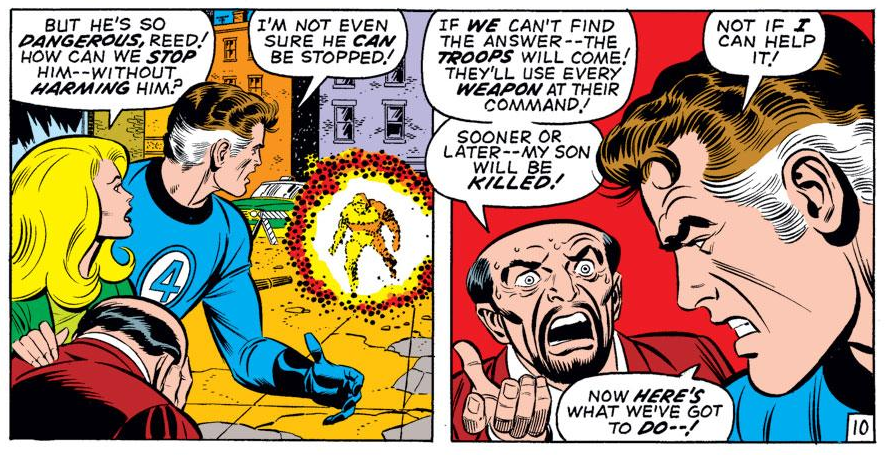
1:07:27-1:25:16: We’re all familiar with the concept of “play fair” mysteries, but Fantastic Four #106 brings up the “entirely unfair” mystery concept, wherein Stan Lee clearly has solved the secret of the monster between issues, leading to a contradiction of what was established in the previous issue — as well as a contradiction of the name of scientist Dr. Zoltan Rambow. (Now he’s “Philip,” disappointingly.) But is that as unexpected as the Human Torch’s newfound Iceman-like superpower? You can tell that Stan’s in charge now, because this issue is the finest example of his Reed Richards Is The Greatest Human Who Has Ever Lived story yet, as Reed harasses his way to victory throughout the entire story. Yes, MRA Reed manages to defeat Larry Monster (That’s right, his name is “Larry.” I didn’t say that Stan’s answer to the monster’s mystery was a good one) purely by berating everyone around them and being demonstrably better than them. If that doesn’t make good drama, what does…?
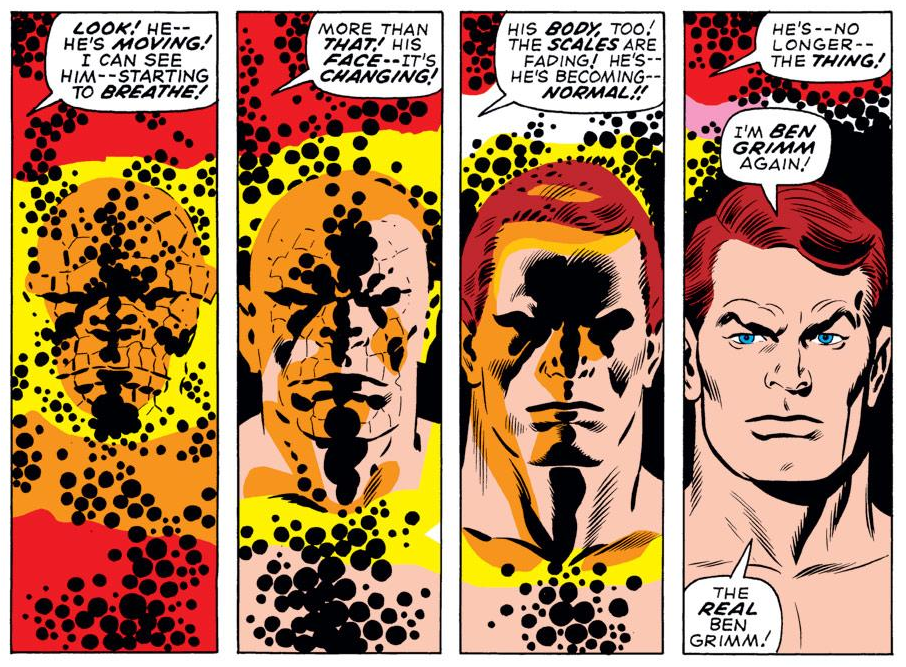
1:25:16-1:40:08: John Buscema arrives to make FF #107 the best issue in awhile — not only the best-looking (but it really is; Buscema and Sinnott are a great team, and Buscema has a dynamism in his work that Romita didn’t), but also the best in terms of story as well, including some surprisingly subtle work when it comes to Ben Grimm not being exactly the man the readers want him to be. Don’t worry, though; it’s not all good stuff — you would be surprised how nervous editorial captions can be, as you’ll discover, and how passive aggressive next issue captions can be. (Very.)
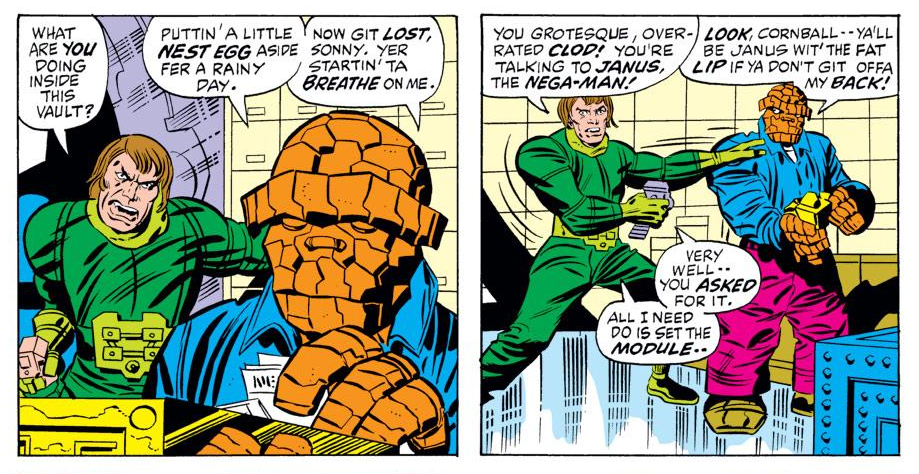
1:40:09-1:49:36: Hey, Jack Kirby’s back! Kind of! Yes, Fantastic Four #108 is the infamous “using leftover Kirby pages to retrofit an origin for a new villain” issue, as Kirby’s rejected original pages for #102 (apparently) are propped up with Buscema/Sinnott/Romita work and Stan dancing around with some dialogue tricks to try and make it all fit. The result is… a very strange one, with it not really adding anything to anything, not least of which the backstory of Janus, the Nega-Man. Jeff’s theory is that this is essentially a fill-in issue to buy the creative team some time, and, really, that’s what it feels like. It’s kind of tragic that the last “new” Kirby in the entire series is so lackluster.
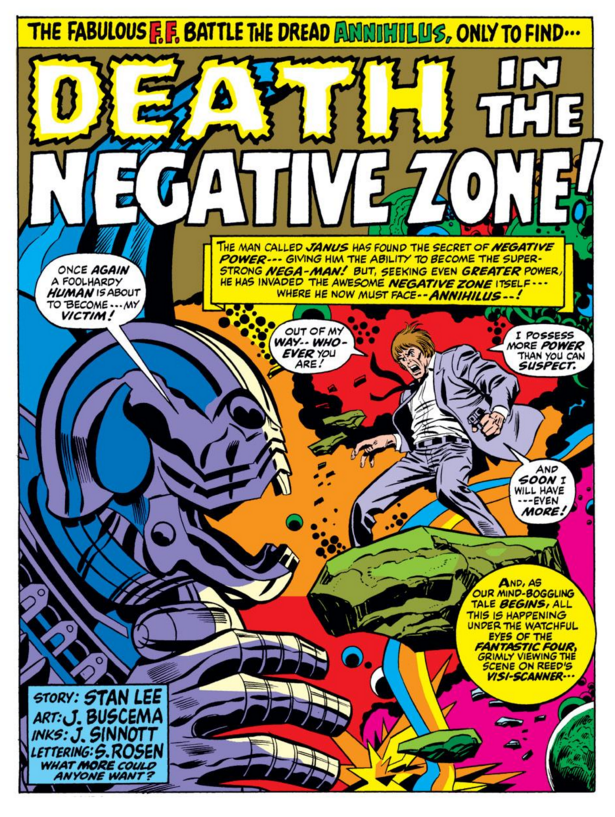
1:49:37-1:56:29: We start FF #109 by talking about the way in which Buscema and Sinnott fit the series far better than Romita managed, and also the way in which the previous issue’s breather really helped out. The series continues its upswing with this one, at least in terms of what Jeff calls the “hustle” of events, but also in the downfall of Janus in a manner in which you least expect it. (Turns out that being an asshat has its downfall, who knew?) As Jeff calls it, the “best TV dinner ever,” because it’s all warmed-up leftovers — but not as much as the next issue, because, hoooooo boy, next issue.
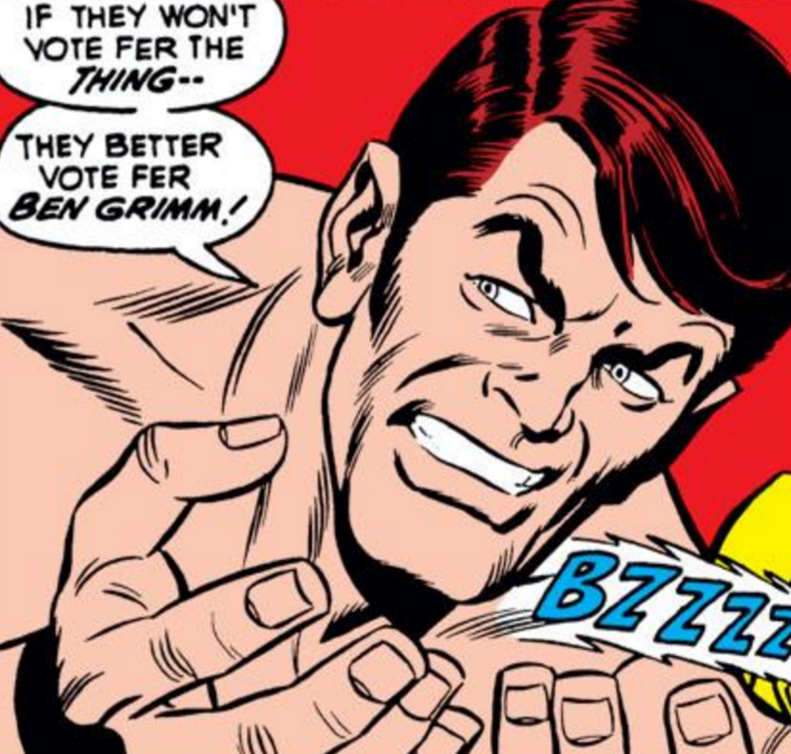
1:56:30-2:06:41: “What can we say about this issue?” I ask about Fantastic Four #110, and surprisingly neither of us answer “Well, it’s a re-run.” But it is a re-run; Reed is adrift in the Negative Zone, and has to be saved by the rest of the team — complicated by the fact that, in a mild twist, Ben has turned into a villain (Is this the ultimate “Stan pass-aggs Kirby in the subtext of the comic” twist? For once, Jeff and I are in agreement. As Jeff puts it, this is the issue where Fantastic Four becomes a Fantastic Four tribute band, and that’s not something that we’re going to recover from anytime soon. Sure, there’s a lot to enjoy in terms of the way the covers are performed, but remember that feeling of breathless innovation that we all felt in the heyday of the Kirby run? That’s gone for quite some time, sadly.
2:06:42-end: We leave things with a bit of a cliffhanger, with Ben having quit the team (again!), and that will come to a head and then some in the issues we’ll cover next episode, Fantastic Four #111-118, which also feature the first Stan Lee-less issues of the series. Yes, it’s all change from here on… in terms of creative teams, at least (In terms of types of stories, not so much). The next year’s worth of Baxter Buildings is going to be an interesting one, as we see how well the team and the book deal with the loss of their guiding lights. (Not very, really.) As we say goodbye, we remind you that you can find us on Twitter, on Tumblr and on Patreon, and Jeff forgets that he has a catchphrase for the show. Thank you as ever for listening and reading the show notes. Jeff, myself and Larry Monster appreciate it greatly.


For those who’d prefer to download the episode themselves, here’s the link: http://theworkingdraft.com/media/podcasts/BaxterBuildingEp13.mp3
Panel 4 of that first image is just crying out for some supplemental captioning, with Reed saying, “This ain’t no disco, this ain’t no fooling around.”
I enjoyed this episode a lot. It was, shall we say, “fascinating”, if perhaps “very strange”, to hear Graeme agree with a bit of Jeff’s psychocriticism. (That’s the critical counterpart to psychohistory, I’m assuming or at least inventing for purposes of this comment.) Felt like a solid case to me, too.
There’s a What If story out there for Romita taking over from Kirby: “What If, instead of turning the Fantastic Four into a Kirby tribute act, Stan Lee let his artist play to his strengths and turned the Fantastic Four into a slice of life soap opera with the occasional threat?” Just like he did with Spider-man. The “Monster In the Streets” splash page is breathtakingly beautiful, and part of me would have loved an entire issue of the cast just going about New York and doing small, everyday things. Which is what Romita was good at. He was as ill-suited toward the Fantastic Four as Jack would have been drawing Spider-Man after Ditko left (which is another What If, I suppose). I wonder whether he was used simply because he was so good at taking over Spider-man, and Lee mistakenly thought that was due to Romita’s skill at mimicry, despite Jazzy John quickly abandoning his Ditko pastiche, and bring his skills from his romance comic days to the title instead.
Wow. That’s fascinating to think about. Pretty sure I’d have wanted to read that.
Yeah, Romita being allowed to play to his strengths rather than against them would have been a way more interesting direction to move things in, especially when one considers that FF and Spider-Man were really the main two Marvel books that were allowed to hard-code in plot advancement.
There’s a theory that Marvel held back the Kirby pages for FF #108 to coincide with the first Fourth World issues hitting the stands and blunt the impact of Kirby’s DC debut. I think there might have been some other Marvel books that month that either went Kirby-reprint or used up their Kirby inventory pages.
I think that’s very much a fan myth and can’t figure out the logistics of how it would work. Marvel would have needed the same lead time to prep an issue for the printer as DC, so how would they have known that far in advance the month the Fourth World issues would have hit? For all some of the pencil art existed, the rest of the issue would have needed work, and their fastest inker (Vince Colletta) was working over at DC on the Fourth World stuff.
Colletta was working at both, actually — one of the reasons he ended up being fired as Kirby’s inker is that through him everyone in the Marvel offices got to see Kirby’s DC work months ahead of publication. See here: http://goodcomics.comicbookresources.com/2007/04/12/comic-book-urban-legends-revealed-98/
Love the podcast fellas, but I don’t know what you have against John Verpoorten. Why do you constantly make a juvenile joke out of his name? It’s not like you actually think his name is Ver Pootin’. The “R” is right there. Why are you clowning the guy?
Other than this arcane mystery, I enjoy the podcast and look forward to your further coverage of the post-Kirby era.
Thanks for the comment, Ford: sadly, I really am that terrible about pronunciation—I was trying my hardest to get it right and still screwed it up.
It seems the context you read things in is everything. The story with the Thing being able to switch to Ben Grimm is the first FF story I read (as a kid in weekly British B&W reprints) so having never seen the tales it was riffing on I remember the tale of Reed stuck in the negative zone as the best thing ever. So the every issue is someone’s first, and the readership recycles so it’s ok to recycle the stories theory was spot on for me! I remember the run from this point on as being great and it seemed to go from one exciting thing to the next without pausing for breath – but in your context of having read from the beginning it’s all going to seem a bit derivative I guess…
A final postscript regarding the art teams following Kirby’s departure from Marvel, and another interesting “what if?”
Where was Joe Sinnott after FF 102? He was seconded to Jack’s other main title, inking over, of all people, Neal Adams. Which seems to indicate to me the idea was to try and make the transition from Jack as seamless as possible, while ignoring what Kirby, and Romita and Adams, brought to the table, which was individuality. The seismic shock of Kirby leaving rocked Marvel’s foundations and it seemed Stan was very much trying to get the readership to accept his departure not by letting Krby’s artistic peers draw to their strengths but instead make sure that the “Marvel style” was set so that it overpowered them.
Rather like Romita, Adams didn’t last long on Thor and was also replaced, this time after only two issues, by John Buscema.
But wouldn’t it have been fascinating if Adams had drawn the Fantastic Four instead of Romita (who himself would probably have been a better fit on Thor)? Adams went on to also replace Kirby on the Inhumans in Amazing Adventures.
John Verpoorten’s inks on the first few issues of The Eternals are personal favourites of mine and worth a look if you’re unfamiliar with them. I was fascinated by the description of Dr Rambow as being a person who endangered someone they had a responsibility to care for (by turning them into a monster) because they had their mind on a higher goal. It struck me it would have been neat (in more than one sense) if there were another set of relationships in the book which this could have paralleled…it’s sort of painful to realise Stan didn’t notice what he’d created.
Remember in 2008, Marvel reconstructed the original Kirby story they had cut up for 108…
http://marvel.wikia.com/wiki/Fantastic_Four:_The_Lost_Adventure_Vol_1_1
Yes! In fact, we talk about it in the very next Baxter Building. Look for that next week!